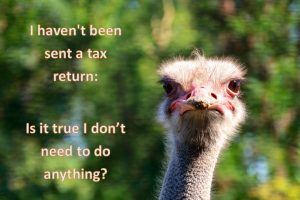
I haven’t been sent a tax return:
is it true I don’t need to do anything?
Many people are unsure of their legal responsibilities regarding tax returns.
The UK 16/17 tax year ends on 5 April 2017.
If HMRC sends you a notice to complete a tax return you have to fill it in. You have till 31 January 2018 to complete the 16/17 tax return if it is filed electronically. If you do it on paper you must send it in by 31 October. If HMRC issues you a tax return and you really do not need to fill it in, you can ring HMRC, explain why, and ask them to cancel the notice. Don’t just ignore the return: you will be fined.
But what if you haven’t been sent a return? The tax system relies on the concept of “self-assessment”. This puts the onus on you, to decide if you need to declare anything, and then to let HMRC know. So, if you haven’t been sent a tax return, you may still need to ask for one.
Let’s look at who might need to do this. You may be able to complete your own return, or you can ask us to prepare the return for you. You might find that you are due a refund of tax.
The following general outlines do not consider all possible reliefs and allowances that may apply to individual circumstances.
People receiving more than £5,000 in dividend income.
Up to tax year 15/16, if you had salary or pension, plus dividends, you usually did not need to do a tax return. Your salary was taxed at source, and dividends were tax free, unless your income was higher than £42,000. For higher incomes, additional tax was due on investment income.
In 16/17, the way dividends are taxed has changed – and may change again depending on what happens to recent Budget proposals. In tax year 16/17, if you receive less than £5,000 from dividends there may still be no tax to pay. But if your investment income is more than this you probably do need to complete a tax return this year. The dividend income will be taxed at 7.5% (with higher rates for higher incomes.) The Chancellor is expected to reduce the tax free band for dividends down to £2,000 in tax year 2018/19.
The dividends do not count if they come from ISA accounts.
People who receive more than £500 in bank interest.
Bank interest no longer has tax taken off at source. If you have this type of Investment income you may need to start completing tax returns. There are tax free allowances depending on your overall income. Again, income from ISA accounts does not count.
People with rental income
If you have any kind of rental income then you should be completing tax returns. Professional advice will help you do this correctly, especially now that the reduction in relief for loan interest will bring more rental income into charge.
Income from overseas
If you have rental or investment income overseas you may complete overseas tax returns, and you might think that all tax has been paid overseas. Don’t make the easy mistake of assuming that you do not need to put this income on UK tax returns. If you are a UK resident you are required to disclose worldwide income. There may be adjustments to stop you being double taxed.
If you receive money from offshore trusts the tax treatments are particularly complex, so it is best to ask for professional advice.
Other types of income that you might have received since 5 April 2016
Have you started working as a self-employed person – this could include E-bay trading?
Are you a restaurant worker receiving significant cash tips?
Have you received income from any kind of UK trust?
Have you taken money out of a single premium insurance policy, creating a chargeable event gain?
Child benefit claims can be taxable if either parent has income over £50,000.
Has PAYE worked correctly on your salary or pension?
If you changed jobs in 16/17 or maybe had more than one job, the PAYE system may not get the right result. People with several small pensions can find that the system tends to overcharge them. It can be worth checking if you are due a refund.
What if you are several years behind in declaring income?
HMRC has increasingly smart resources of information that allows then to join up the dots and identify people who have undeclared income in the UK. Rentals and investment income are probably the easiest for them to spot. When HMRC identifies arrears they ask individuals to declare the backlog, and they charge interest and penalties.
If you can make a voluntary disclosure the penalties charged are significantly lower than if disclosures have been required by HMRC.
HMRC also has new international information exchange agreements, including most of the main tax haven countries and uses smart systems to match up records. If you need to catch up on an offshore issue it is particularly important to have professional advice.
Arrears cases are almost always treated as civil offences, not criminal, so if you do need to catch up on tax matters you should not worry about being sent to prison. Instalment payments can often be agreed.
Most people find great relief from sorting out historic problems, even if the financial hit can be tough. One client was a young health professional who was 6 years behind in declaring significant self-employed income. He was terrified he might be sent to prison and it was hard to calm him down and persuade him that this was unlikely. Once this sunk in, he felt able to propose marriage to his then pregnant girlfriend. He is now married, an enthusiastic dad, and up to date with HMRC.
If you think you might fall into any of these categories, come and talk to Rose Duly CTA ACA at Andrews and Palmer. She will help you work out what you need to do, has many years’ experience in dealing with voluntary disclosures and can help you through the process.
01747 823147 rose@andpal.co.uk







